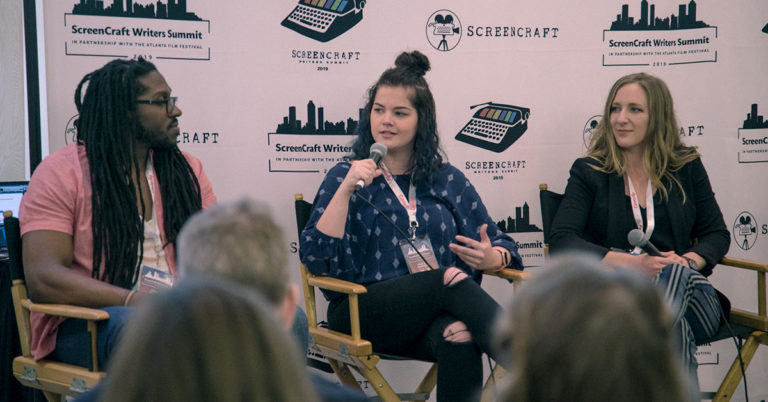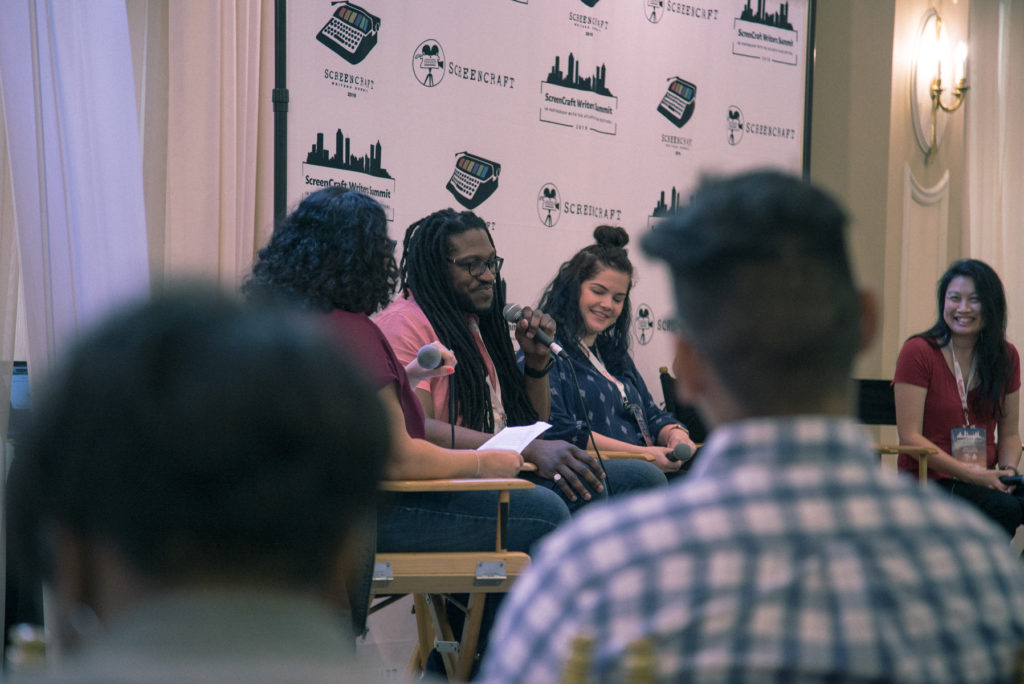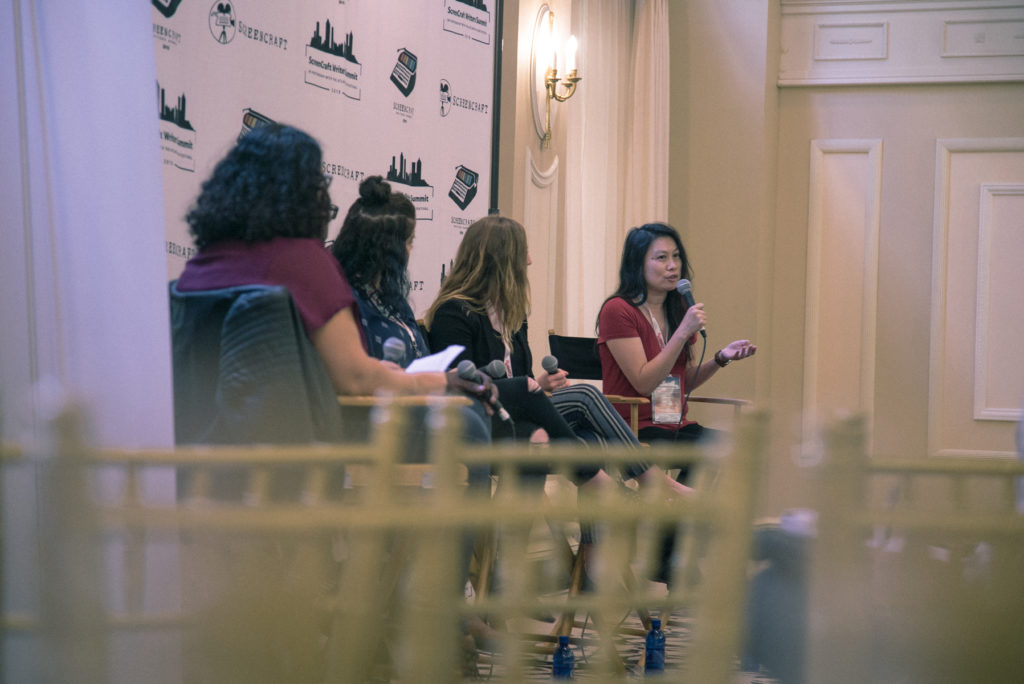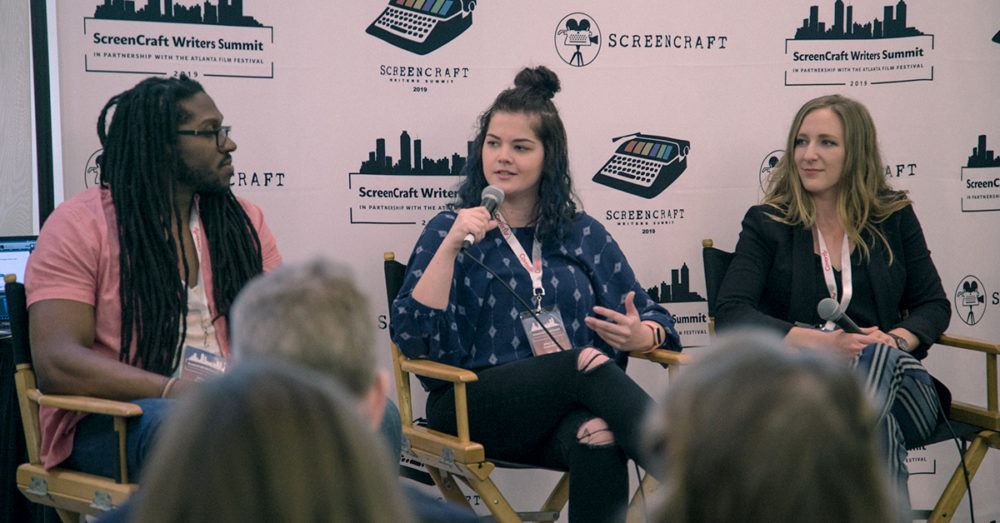The Importance of Screenwriting Competitions and Fellowships

Pictured above: Steven DeBose - Austin Film Festival Competition Director, Anna Vecellio - Atlanta Film Festival Screenplay Competition Director and Abigail Boland (Competition Coordinator for HUMANITAS).
The following is written by Mitch Olson, who was with us all weekend at the ScreenCraft Writers Summit in Atlanta. If you're interested in attending next year's summit, pre-order your badge here. Read Mitch's take on the opening of the summit here. His recap of Day 2 which contains 8 Big Takeaways from ScreenCraft Writers Summit can be found here. Below is his recap of the Screenwriting Competitions and Fellowships AMA panel from Day 3.
“Writing competitions and fellowships can literally change your life.” - Steven DeBose, Austin Film Festival Competition Director
Aspiring writers should strongly consider getting their scripts out to reputable competitions, fellowships and labs.
I wrote in my last post that writers could live anywhere and still find success, and that managers and agents are willing to take chances on writers from all over the country and the world if their writing is good. And after three days at the ScreenCraft Summit, and attending many panels and workshops, one of the burning questions that the writers in these audiences kept asking, again and again, was: “How do I get noticed?”
Competitions and fellowships. That’s the answer.
Screenwriting Competition and fellowships like the ones hosted by ScreenCraft, the Austin Film Festival, Nicholl Fellowship, Atlanta Film Festival, and HUMANITAS, have many years – some have decades – of experience breaking down barriers for emerging writers and giving them opportunities to get noticed based on the quality of their work, rather than who they know. They’re leveling the playing field and, like Steven said, changing lives by facilitating talent discovery and promotion.
If agents and managers spent all their time reading unsolicited scripts, they wouldn't have time to perform their function in the industry, which is to advocate for their clients, package and sell projects. They rely on friends and colleagues to recommend good unrepresented writers as potential clients - and they also rely on talent-discovery programs, such as reputable screenwriting competitions, fellowships and labs.
Learn everything you need to know about screenwriting contests, competitions and fellowships with this free guide.
Steven was joined by Joan Wai (The Academy Nicholl Fellowships), Anna Vecellio (Atlanta Film Festival Screenplay Competition Director), and Abigail Boland (Competition Coordinator for HUMANITAS New Voices). Here’s what they had to say:
The best thing about competitions and fellowships is that they’re merit-based.
The submissions are judged by experienced script readers purely based on the quality of the story and the writing — who you know, or where you’re from doesn’t matter.
You’re up against the same elements in the contests as you are in the industry, just on a different plane.
The quality of content is always subjective, whether you’re submitting to studios, producers or contests. The good news is that most respected contests use professional readers with extensive industry experience. This reflects industry expectations and assessment. And if you think contest readers are inundated with material or tired of reading, guess what: it’s not even close to how much development assistants and interns need to read at the major studios and agencies. They do this day in and day out with ten times the amount of material. At the end of the day, THAT is who you’re up against in the “real world”. Bottom line: contests give writers access to the same educated and experienced readers who work or have worked in the industry. The difference is, unlike a production company or studio, anyone can submit and get read by a competition's readers, because there are no gatekeepers in the way, refusing your “unsolicited material”.

Pictured above: Moderator - Julia Camara, Steven DeBose of the Austin Film Festival Competition, Anna Vecellio of the Atlanta Film Festival Screenplay Competition, and Joan Wai of The Academy Nicholl Fellowships.
Enter as many as you can.
The more your project gets out there, the better chance you have of getting your work seen and your voice heard. If you have a particular niche, then try to find contests that speak to that niche. And don’t be afraid to adapt your material to other media. There’s often less competition the more niche you get, and that increases the chances that your work will get seen. Some writers have found success adapting their stories to plays, podcast scripts, books and/or graphic novels.
The directors of these competitions and fellowships are often approached by producers and literary managers, which gives them an accurate sense of what the industry is currently looking for.
They can then, in turn, work hard to connect writers and projects with appropriate industry pros. They also have extensive contacts and mailing lists from which writers can benefit.
You don’t always have to win to find success.
Often the semifinalists or finalists end up on their lists of top writers, and the non-winners can find just as much success as the winners. Although the cash prizes and recognition are nice, it’s really the exposure to working industry professionals that matters.
For those who do win, however, most competitions have a mentorship element to help connect writers with directors, producers, etc.
Industry access is important, and that’s why contests are effective – they help bridge the gap. HUMANITAS, for example, pairs "baby writers" with veteran showrunners who help hone their scripts: “Somebody who has the job to help get you a job.” The winners of contests sometimes get to meet their judges, especially at film festivals like Austin Film Festival and the ScreenCraft Writers Summit. They get to hear what the judges liked about their script.

Pictured above: Moderator - Julia Camara, Anna Vecellio - Atlanta Film Festival Screenplay Competition Director, Abigail Boland (Competition Coordinator for HUMANITAS) and Joan Wai (The Academy Nicholl Fellowships).
Your script doesn’t have to be perfect (hint: it never will be).
But all of the panelists agreed that there are some do’s and don’t’s. The most important things to keep in mind when submitting is making sure your draft is proofread and formatted correctly. Make it look professional. Also, remember you’re writing film/TV so write visually. And, obviously, know the rules! Make sure you read the FAQ and rules and terms pages for each competition carefully. They vary and each has their own guidelines in regards to title pages, page count, format, category, etc. Know, too, where and what you’re submitting. Don’t submit a pilot to a feature contest, or vice versa, or a comedy to a drama competition.
Many competitions and fellowships also provide coverage or feedback from professional readers.
These creative notes give submitters actionable feedback to help the writer improve their script leading up to the next competition. Part of the process of being a writer is to take creative feedback, so this is a critical skill to develop. Be constantly rewriting. Re-submit. And when you get notes that are contradictory, try to find commonalities between them that identify similar issues and use the notes to identify and improve your weaknesses. Often there's a "note behind the note" which you can deduce through reflection and creative thinking. But you also need to balance executing notes and staying true to your vision. Ultimately, you should use the coverage to understand how others are seeing and reacting to your material. Don't take any single reader's feedback as gospel. Not everyone will like what you write, just in the same way that not everyone likes the same movies. But the notes should force YOU to see your work differently and observe how others perceive it. Coverage – whether from a competition or a paid coverage service – is a fantastic resource because it allows writers who may not have a screenwriting community in their city or town to form organic relationships with other writers who know the craft. Writers can use this honest and productive feedback to improve their work. Writing, after all, is rewriting.
One great anecdote from the panel was about a writer who had submitted to the fellowship 28 times and finally won on the 29th.
That particular writer’s film premiered at Sundance this past year and sold to Netflix for $8m. Persistence and the ability to take and execute feedback to improve your writing is a recipe for success. Keep writing. Keep submitting.
Many of these competitions and fellowships, especially from the ScreenCraft, Nicholl, Austin, Atlanta, and HUMANITAS have countless amazing success stories from previous winners and finalists who have gone on to write major feature films, get staffed on TV shows, and become showrunners. Be sure to check out Coverfly to find reputable competitions, fellowships and organizations to which you can submit your work. Be sure to research a competition before you submit, so you're confident it's reputable and a good fit for your particular screenplay.
Good luck out there, and see you at the ScreenCraft Summit next year!
 Mitch Olson is the Founder and CEO of Point South Productions, a literary management and development company based in Georgia. Prior to moving to out east, he worked in Los Angeles in development and on shows for NBC, Fox, CBS and Netflix. In addition to Mitch's work at Point South Productions, he teaches Screen and TV Writing at Kennesaw State University where he is building a Screen and TV Writing MFA program and training the many diverse and talented writers that he hopes to one day represent and work with. Additionally, he has partnered with Georgia Film Academy to develop high school curriculum aimed at providing students with skills and career opportunities in dramatic writing.
Mitch Olson is the Founder and CEO of Point South Productions, a literary management and development company based in Georgia. Prior to moving to out east, he worked in Los Angeles in development and on shows for NBC, Fox, CBS and Netflix. In addition to Mitch's work at Point South Productions, he teaches Screen and TV Writing at Kennesaw State University where he is building a Screen and TV Writing MFA program and training the many diverse and talented writers that he hopes to one day represent and work with. Additionally, he has partnered with Georgia Film Academy to develop high school curriculum aimed at providing students with skills and career opportunities in dramatic writing.
Photo credit: Dan Rutkowski
For all the latest ScreenCraft news and updates, follow us on Twitter, Facebook, and Instagram.
Get Our Screenwriting Newsletter!
Get weekly writing inspiration delivered to your inbox - including industry news, popular articles, and more!



























